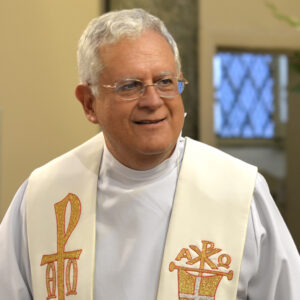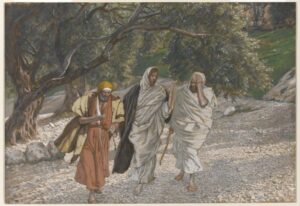Sunday Reflections
11th Sunday in Ordinary Time – June 18, 2023

Reflection by:
Fr. Paul Voisin, CR
Jesus, in His wisdom, chose twelve disciples to become his apostles. He would share with them His life, and eventually His ministry. When we hear their names mentioned, we associate them with particular parts of Sacred Scripture, especially Peter, and Judas Iscariot. Matthew, the tax collector, and Thomas, the doubter, may also come to our mind, upon further reflection. We have some sense of ‘personality’ of each of them.
Today, here and now, we are those disciples. We have been chosen. We are the “labourers” in the harvest of the kingdom of Jesus Christ, the King. We may not want to accept that responsibility, as it is tremendous, but just as Jesus gave His grace, power, and authority to the twelve (even the unfaithful Judas Iscariot), He will share it with us to be His faithful disciples.
The mandate for the disciples sounds daunting. Our “lost sheep” are the people whom God has given us, people (like us) in need of God’s love and mercy. We are sent to ”cure the sick, raise the dead, clean the lepers, cast out devils”. We can remember many times in Sacred Scripture when Jesus did just that, bringing relief, healing and new life to those in need. Sometimes they approached Him, and other times He reached out to them. In our time and place, there may be some people – family, friends, coworkers and classmates – who approach us with their ‘infirmity’. It might be fear, doubt, guilt, resentment, anger, or hatred. These realities ‘cripple and infirm’ (cure the sick), ‘kill’ (raise the dead), ‘disfigure’ (clean the lepers), and ‘torment’ (cast out devils). They may not appear to us to be physically disfigured, or blind, or deaf, or maimed, or in danger of death – but their mind, heart and soul may be burdened and in peril. Jesus sends us to them! We may not feel we have the answer, the magical solution, or healing powers or saving words. First of all, we need to let God work, and leave room for the Holy Spirit. We don’t need to quote the Scriptures, or the Catechism of the Catholic Church. We can listen and speak ‘heart to heart’. I believe there is no greater ministry to another than to speak from our own experience: how we overcame those negative feelings thoughts, experiences and even people; how God touched us, sometimes surprising us; how we dealt with the same reality, and (over time, through God’s grace) survived. Secondly, we need to show compassion. Compassion means ‘to suffer with’. Sometimes we may have words to share, but sometimes we have no words. There is nothing more upsetting than someone who says “I know how you feel”, and in the heart of the one suffering they know the other has no idea “how they feel”. Sometimes just our silent accompaniment, our embrace, or our words that “I am here for you” go a long way to bring about healing and comfort. Thirdly, we must see ourselves as instruments of God, not obstacles, bringing faith, hope, and love to them in their need. We want to restore their faith in God and in themselves, and those who accompany them. We want to give them hope that God will continue to do the improbable and the impossible, as He did when He raised Jesus from the dead. We want to be an expression of God’s unconditional love for them, helping them to realize that God is with them, and that they too are chosen by God.
Bogdan Jański not only embraced the mission of Jesus, but he went out to others, beginning with Peter Semenenko and Jerome Kajsiewicz. He, too, attracted the confused and disenfranchised (in particular, by the loss of Poland to Russia), those doubtful and fearful of their future (and that of Poland), to bring them into union with Christ, and to work with him for “the resurrection of society”.
Share This Post
More To Explore

16th Sunday in Ordinary Time – July 21, 2024
We have a Good Shepherd. Jesus will never abandon us. He will never forsake his people. But his shepherding needs to be embodied in our lives and actions today.

15th Sunday in Ordinary Time – July 14, 2024
This week Jesus sends out his disciples in pairs to preach repentance, and to heal. Once again, He prepares them for difficulties and hardships.
